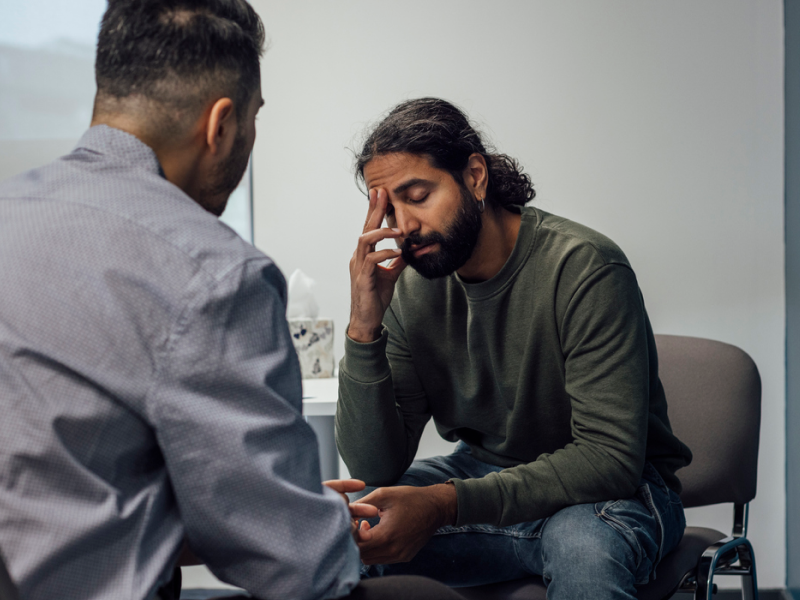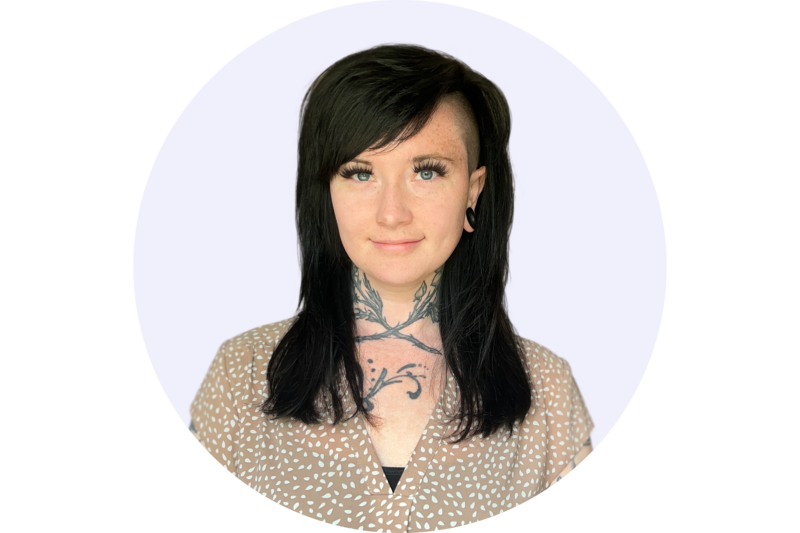
Table of Contents
What Are the Best ADHD Medication for Adults With Anxiety?

Written By: Dr. Eli Muhrer, M.D.

Clinically Reviewed By: Rebecca Holland
August 21, 2024
6 min.
Hear from experts about the best treatment for adults with both ADHD and anxiety.
Learn more about our Clinical Review Process
Table of Contents
Among the millions of U.S. adults with ADHD, experts estimate about half struggle with at least one comorbid anxiety disorder. For those with both conditions, it’s crucial to find a way to manage the symptoms of each. Often, managing ADHD can help reduce overall anxiety, as treating ADHD symptoms, such as improving executive function, can alleviate stress and anxiety related to time management and organization, says Claire Streeter, PMHNP, ARNP, a Charlie Health Psychiatric Mental Health Nurse Practitioner. Similarly, treating anxiety can help reduce ADHD symptoms, as anxiety is distracting and can steal a person’s attention.
Medication is a common treatment for ADHD in adults and children alike, but people with anxiety have to take careful considerations when choosing an ADHD medication due to the risk of worsening anxiety symptoms. Read on to learn about whether you should choose a non-stimulant or stimulant medication to treat your ADHD if you have anxiety, as well as other non-pharmaceutical treatment approaches.

Begin virtual therapy and medication management for anxiety and ADHD today
Fill out our quick form below to learn if Charlie Health is right for you.
The best ADHD medications for adults with anxiety
Before diving into medication options, it’s important to note that treating your anxiety disorder first is often the first step. Getting the anxiety symptoms under control can make a big difference by freeing up more attention and reducing the distraction of worry. You can even look at anxiety disorders as attentional disorders themselves because attention is a “limited resource,” and anxiety can absorb a significant amount of it. Simply put, anxiety can be incredibly distracting.
So, many providers recommend taking the approach of treating the anxiety disorder first, whether with therapy, medication, or both. The most common first-line medications for anxiety disorders are antidepressants known as selective serotonin reuptake inhibitors (SSRIs), such as Zoloft and Lexapro. Serotonin and norepinephrine reuptake inhibitors (SNRIs), such as Effexor and Cymbalta, are also commonly prescribed.
Once your anxiety is under control, you might notice you can pay better attention and have improved executive function and not even need medication for ADHD. However, some people need medication for both anxiety and ADHD.
Regarding ADHD, stimulant medications, like Adderall or Ritalin, are typically the first-line pharmaceutical treatment for ADHD symptoms, says Streeter. However, a stimulant isn’t necessarily the best option for people with comorbid anxiety and ADHD because nervousness and anxiety are common side effects of these medications. As mentioned, you want to make sure that your anxiety disorder is well managed before you consider taking a stimulant. A psychiatric provider will help you make this call.
“A stimulant tends to be energizing, giving you motivation, helping with those executive dysfunction pieces –– but that can also activate people and make them feel more on edge and more tense,” Streeter says. “You can have some worsening of racing thoughts, worried feelings, and physical anxiety symptoms, such as heart racing.”
That said, taking a stimulant ADHD medication while you have anxiety doesn’t guarantee that you’ll experience worsened anxiety, but there’s certainly a good chance of it if you go with this treatment option, especially if your anxiety is not well-managed before starting a stimulant. For that reason, if you struggle with anxiety, non-stimulant medications may be a better first choice. There are a few non-stimulant medication options, but Streeter says some of the most commonly prescribed for adult ADHD are as follows:
Strattera
Wellbutrin
Medications for other co-occurring conditions
A selective norepinephrine reuptake inhibitor (SNRI) used to address ADHD symptoms by affecting norepinephrine levels.
An antidepressant sometimes used off-label to treat ADHD, though it is not FDA-approved for this purpose.
For individuals with ADHD and other conditions like anxiety or depression, providers may prescribe additional medications to manage all symptoms effectively.
Strattera
This is the brand name for atomoxetine, which falls under the category of selective norepinephrine reuptake inhibitors (SNRIs). Strattera acts on the neurotransmitters norepinephrine and dopamine, which play a role in ADHD symptoms. It affects these brain chemicals in the frontal cortex, the part of your brain that helps with attention and filtering out distractions. Norepinephrine also plays a role in anxiety disorders, not just ADHD, so some people report that taking atomoxetine also helps reduce their anxiety as well as ADHD symptoms. It is important to note that atomoxetine is not FDA-approved for anxiety disorders.
Effexor
This is the brand name for an SNRI, venlafaxine. It is not FDA-approved for ADHD treatment, but some research shows that the medication can reduce ADHD symptoms in adults. As a bonus, it’s FDA-approved for treating generalized anxiety disorder and panic disorder.
Wellbutrin
Although it’s technically an antidepressant, Wellbutrin (the brand name for bupropion) is sometimes prescribed off-label to treat ADHD. This means the FDA has not approved bupropion for this specific indication, but there still is evidence that the medication can be helpful for this use. Some people with anxiety experience an increase in anxiety when taking this medication so it is important to monitor for any worsening of anxiety when taking Wellbutrin. This is not typically used as a first-choice medication for someone with anxiety and ADHD. It’s more of a fit for someone with ADHD and depression.
Qelbree
Like Wellbutrin, Qelbree (the brand name for viloxazine) is a norepinephrine reuptake inhibitor. It works by increasing levels of norepinephrine, a neurotransmitter associated with attention and mood regulation. Qelbree is FDA-approved for treating ADHD in children (6+) and adults and is a non-stimulant medication, making it a suitable option for people with ADHD and anxiety who may not tolerate stimulants well or prefer a non-stimulant treatment.
Medications for other co-occurring conditions
In instances where someone is struggling with ADHD, anxiety, and another co-occurring condition, a provider may consider another medication or combination of medications, Streeter says. For instance, if you have an anxiety disorder and depression on top of ADHD, they might also prescribe an antidepressant to address those other symptoms (these medications are typically non-stimulants).
In addition to anxiety, it’s very common for ADHD to co-occur with other mental health conditions. It’s estimated that up to 80% of people with adult ADHD also have another diagnosis. For instance, it’s common for ADHD to occur alongside a mood disorder, such as depression or bipolar disorder. On top of managing ADHD symptoms, medication can help you address symptoms of any other conditions.
Ultimately, the best medications and treatment for people with both ADHD and anxiety (or another condition) will vary from person to person. There’s no one-size-fits-all approach. Your doctor will decide which ADHD medication is the safest and most potentially effective choice for you, taking into account both your ADHD symptoms and other mental health symptoms. Your provider will help you weigh the benefits and risks, deciding the best fit.
What are non-medication treatment options for ADHD?
Psychotherapy, colloquially known as talk therapy, is a crucial part of adult ADHD treatment. “There are a lot of different strategies and non-pharmacologic interventions out there that can be a lot better tolerated than some of the [stimulant] medicines,” says Streeter. She notes that for many people, a combination of medication and therapy is the most effective treatment approach for ADHD symptoms.

A therapist, especially one who specializes in managing ADHD, can teach you how to:
- Improve your overall executive functioning
- Get and stay organized
- Develop better time management skills
- Effectively problem solve
- Control and reduce your impulsivity
- Build self-confidence and self-esteem
- Manage anger
- Maintain healthy relationships
- Address negative thought patterns and beliefs surrounding your ADHD
Your therapist can also help you address symptoms of any other co-occurring mental health conditions, helping to improve your mental health and well-being overall.
Cognitive behavioral therapy (CBT) is a commonly used therapy modality for people with ADHD, Streeter says. This form of therapy is effective for treating symptoms related to many conditions, including ADHD. CBT helps you gain awareness of your thoughts, feelings, and behaviors while helping you understand how they all work together and impact your life. You can address any negative thought patterns or beliefs that impact your self-esteem, functioning, and well-being.

ADHD and anxiety treatment at Charlie Health
If you struggle with attention-deficit/hyperactivity disorder and an anxiety disorder, Charlie Health is here to help. Our virtual Intensive Outpatient Program (IOP) provides more than once-weekly mental health treatment for individuals and families dealing with serious mental health conditions, such as severe ADHD and anxiety.
Our expert clinicians incorporate evidence-based therapies into individual counseling, family therapy, and group sessions. We also offer medication management to clients as needed for those who could benefit from psychiatric medications on top of therapy. Our prescribers can determine if a stimulant or non-stimulant medication is right for you and develop an effective treatment plan to help you manage your symptoms. With this kind of holistic mental health treatment, recovery is within reach. Fill out the form below or give us a call to start healing today.
References
https://www.ncbi.nlm.nih.gov/pmc/articles/PMC5567978/
https://www.ncbi.nlm.nih.gov/books/NBK470212/
https://medlineplus.gov/druginfo/meds/a603013.html#
https://my.clevelandclinic.org/health/treatments/11766-adhd-medication
https://www.ncbi.nlm.nih.gov/books/NBK539896/




